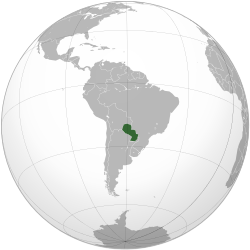Paragúáì
| Àyọkà yìí únfẹ́ ìyílédèdà sí Yorùbá. Ẹ ran Wikipedia lọ́wọ́ ṣàtúnṣe sí ìyílédèdà |
Paragúáì (US /pɛərəɡwaɪ/, UK /pærəɡwaɪ/), officially the Republic of Paraguay (Spánì: [República del Paraguay] error: {{lang}}: text has italic markup (help) [reˈpuβlika ðel paɾaˈɣwai], Guaraní: Tetã Paraguái [teˈtã paɾaˈɣwaj]), is a landlocked country in South America. It is bordered by Argentina to the south and southwest, Brazil to the east and northeast, and Bolivia to the northwest. Paraguay lies on both banks of the Paraguay River, which runs through the center of the country from north to south. Due to its central location in South America, it is sometimes referred to as Corazón de América, or the Heart of America.[6]
Orílẹ̀-èdè Olọ́mìnira ilẹ̀ Paragúáì Republic of Paraguay | |
|---|---|
Motto: Paz y justicia (Híspánì) "Peace and justice" | |
 | |
| Olùìlú àti ìlú tótóbijùlọ | Asunción |
| Àwọn èdè ìṣẹ́ọba | Spanish Guaraní[1][2] |
| Àwọn ẹ̀yà ènìyàn (2000) | Mestizo (mixed European and Amerindian) ~80% White (European) ~20% unmixed Amerindian 1-3% Asian 1-4% black 1% other 1-2.5% |
| Orúkọ aráàlú | Paraguayan |
| Ìjọba | Unitary presidential constitutional republic |
| Federico Franco | |
| Óscar Denis | |
| Aṣòfin | Congress |
| Chamber of Senators | |
| Chamber of Deputies | |
| Independence from Spain | |
• Declared | 14 May 1811 |
• Recognized | 15 May 1811 |
| Ìtóbi | |
• Total | 406,752 km2 (157,048 sq mi) (60th) |
• Omi (%) | 2.3 |
| Alábùgbé | |
• 2009 estimate | 6,454,548 [3] (103rd) |
• Ìdìmọ́ra | 14.2/km2 (36.8/sq mi) (204th) |
| GDP (PPP) | 2011 estimate |
• Total | $35.346 billion[4] |
• Per capita | $5,412[4] |
| GDP (nominal) | 2011 estimate |
• Total | $21.236 billion[4] |
• Per capita | $3,252[4] |
| Gini (2008) | 50.8 high |
| HDI (2011) | ▲ 0.665[5] Error: Invalid HDI value · 107th |
| Owóníná | Guaraní (PYG) |
| Ibi àkókò | UTC-4 |
• Ìgbà oru (DST) | UTC-3 |
| Ojúọ̀nà ọkọ́ | right |
| Àmì tẹlifóònù | 595 |
| Internet TLD | .py |
The Guaraní have been living in Paraguay since before the arrival of Europeans in the 16th century, when Paraguay became part of the Spanish colonial empire. Following independence from Spain in 1811, Paraguay was ruled by a series of dictators who followed isolationist and protectionist policies. This development was truncated by the disastrous Paraguayan War (1864–1870) in which the country lost 60% to 70% of its population and large amounts of territory. During a large part of the 20th century, Paraguay was ruled by Alfredo Stroessner, who led one of South America's longest lived military dictatorships. In 1989 Stroessner was toppled and free elections were celebrated in 1993. In 1994 Paraguay joined Argentina, Brazil and Uruguay to found Mercosur.
As of 2009 the population was estimated at 6.3 million. The capital and largest city is Asunción. The official languages are Spanish and Guaraní, both being widely spoken in the country, with around 92% of the general population speaking Spanish and 98% speaking Guaraní.
Though it remains one of the region's poorest and least-developed countries, in 2010, Paraguay's economy grew by 14.5%, the largest economic expansion in Latin America, and the third fastest in the world after Qatar and Singapore.[7] By 2011, economic growth slowed but remained high, at 6.4%.[8]

|
Àyọkà yìí tàbí apá rẹ̀ únfẹ́ àtúnṣe sí. Ẹ le fẹ̀ jù báyìí lọ tàbí kí ẹ ṣàtúnṣe rẹ̀ lọ́nà tí yíò mu kúnrẹ́rẹ́. Ẹ ran Wikipedia lọ́wọ́ láti fẹ̀ẹ́ jù báyìí lọ. |
Itokasi
àtúnṣe- ↑ Paraguay – Constitution, Article 140 About Languages. International Constitutional Law Project. http://www.servat.unibe.ch/icl/pa00000_.html#A140_. Retrieved 2007-12-03 (see translator's note)
- ↑ "8 LIZCANO" (PDF). Convergencia.uaemex.mx. Archived from the original (PDF) on 2014-02-24. Retrieved 2012-10-05.
- ↑ Department of Economic and Social Affairs Population Division (2009) (PDF). World Population Prospects, Table A.1. 2008 revision. United Nations. http://www.un.org/esa/population/publications/wpp2008/wpp2008_text_tables.pdf. Retrieved 2009-03-12.
- ↑ 4.0 4.1 4.2 4.3 "Paraguay". International Monetary Fund. Retrieved 2012-04-20.
- ↑ "Human Development Report 2011" (PDF). United Nations. 2011. Retrieved 9 November 2011.
- ↑ "Paraguay, corazón de América (1961)". IMDb.com. Retrieved 2012-10-05.
- ↑ CIA <<GDP - Real Growth Rate Archived 2012-10-25 at the Wayback Machine.>> Accessed on 19 September 2011.
- ↑ "Paraguay". State.gov. 2012-03-15. Retrieved 2012-10-05.

